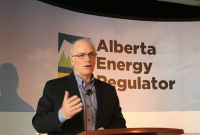Support strong Canadian climate journalism for 2025
Like a sports coach coming off a disappointing season, the new head of the agency that regulates Alberta's heavily challenged energy industry knows he's got some work to do.
"One (goal) is rebuilding confidence in the leadership internally," Laurie Pushor said in an interview.
"Confidence in the public and government and the industry that we are a good team of people and that we're doing our best and that we're open to continuing to improve."
Pushor, two weeks into the job, replaces Jim Ellis as boss of the Alberta Energy Regulator. Ellis left last November after investigators found serious mismanagement, misuse of about $2.3 million and a "culture of fear" among whistleblowers.
"Improvement will include continuing to strengthen transparency and continuing to strengthen accountability for our performance," Pushor promised.
That's not the only challenge he and the energy regulator face.
There's an enormous backlog of abandoned and orphaned wells that will cost someone billions to clean up. There are difficult relationships between the regulator, First Nations and landowners.
And there's the industry itself for which profits and reserves are declining.
Don't count Alberta out yet, said Pushor. Notwithstanding the uncertainties of COVID-19 and international oil price wars, there's still money to be made, he said.
"If you look at recovery rates and the innovation that industry is applying to known reserves, not only might we not be presiding over an industry in decline, but you might see a bit of a renaissance in conventional production."
Rebuilding trust with First Nations is another priority for Pushor. In his previous job as Saskatchewan's deputy minister of energy and resources, he worked with a traditional knowledge-keeper, he said.
"He is relentless in reminding me that it's about relationships," said Pushor, who promises plenty of face-to-face time with Indigenous leaders.
"If you're not in a relationship, you're not going to be able to move things forward. We, as the regulator, need to be in a good relationship with First Nations."
Pushor wants the same kind of contact with landowner groups, who have often been critical of how industry uses their land and treats them.
"It'll start with three or four of the larger groups out there that have organized. I look forward to catching up and understanding their issues and seeing what can be done to move things ahead."
When it comes to cleaning up wells, Pushor acknowledges he's got some work to do to grasp the legal ins and outs. Critics have long pushed for a legislated timeline for dealing with old infrastructure and say that the province's calculations on whether a well owner has the wherewithal for cleanup are antiquated.
Pushor asks for a little time to dig into those issues.
"The government's the policymaker," he said. "They're going to give us the framework they want us to operate in."
There's an inevitable tension between business, environmental and public concerns, Pushor said.
"That tension is real and it should be. What makes a regulator effective is ensuring that tension is balanced."
He believes the public still has faith in the Alberta Energy Regulator, despite its internal and external problems.
"Confidence in the industry and the regulator, while they may have eroded somewhat, remains relatively stable. But we can always do better and we should."
This report by The Canadian Press was first published May 2, 2020






Comments